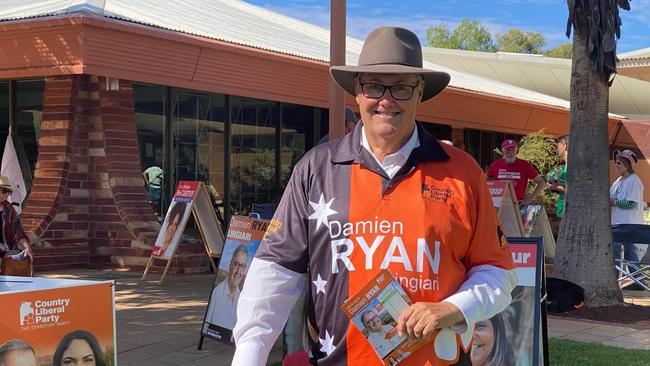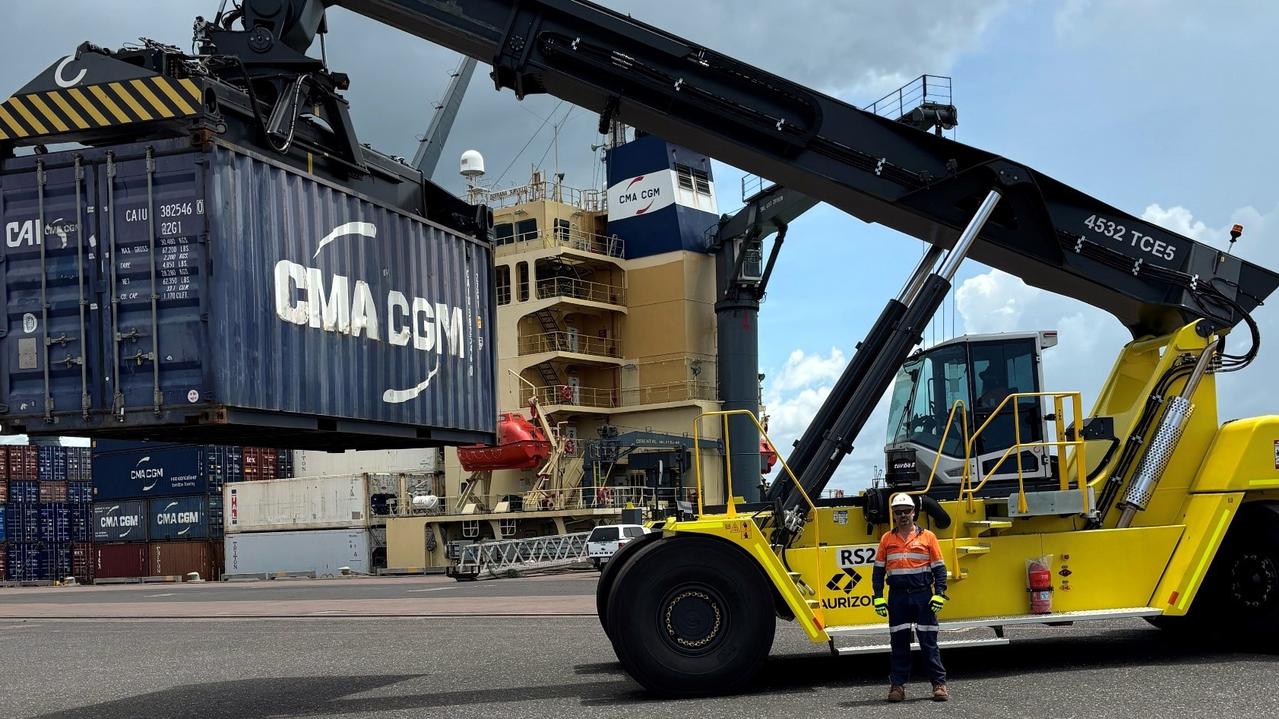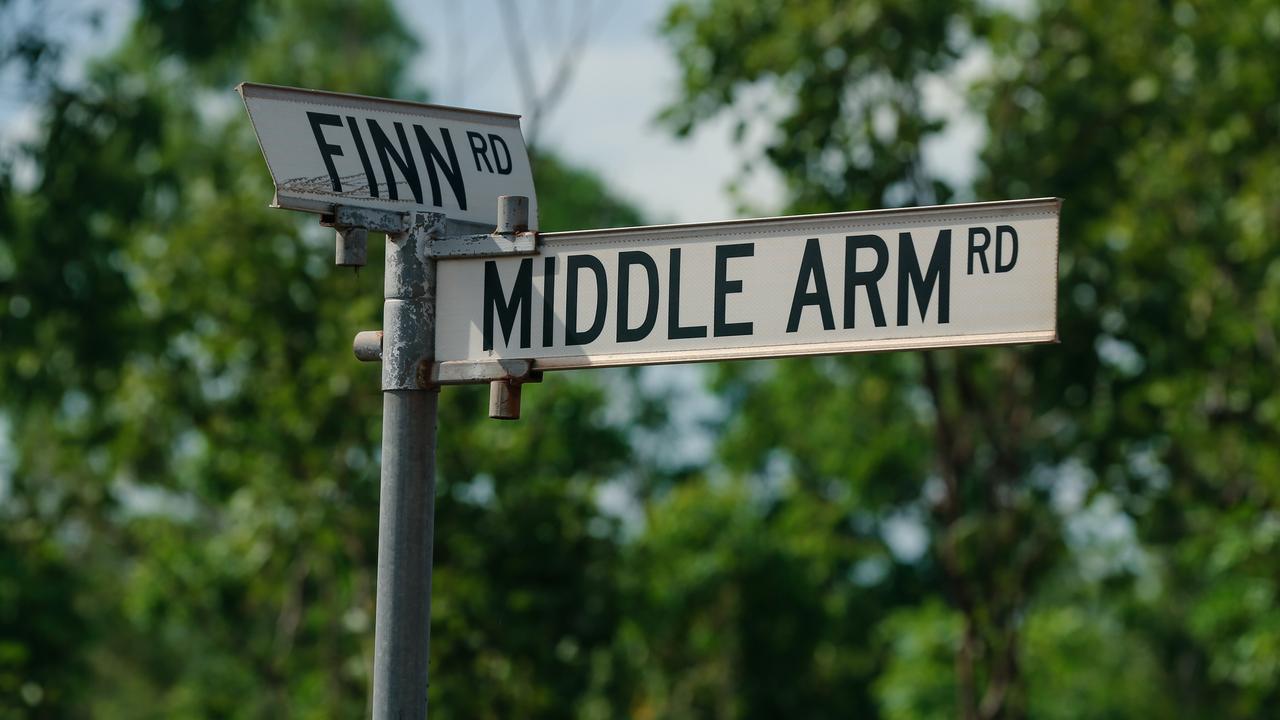Marion Scrymgour claims victory in Lingiari after tight contest
EXCLUSIVE: In her first interview since declaring victory in Lingiari, Marion Scrymgour has vowed the Greens will come to agree with Labor’s fracking reforms and urged for more resources to drive voter turnout in her electorate.

Northern Territory
Don't miss out on the headlines from Northern Territory. Followed categories will be added to My News.
A VICTORIOUS Marion Scrymgour has blamed “argy bargy” and a lack of impartial interpreters at remote polling stations for a dramatic fall in Lingiari’s turnout, in her first interview since claiming victory in the vast Territory seat.
Ms Scrymgour, who previously served as a deputy NT chief minister, also vowed federal Labor would implement the findings of the Pepper Inquiry into fracking and wouldn’t cave to the demands of a growing Greens Party presence in parliament.
Speaking to the Sunday Territorian, Ms Scrymgour said “shenanigans” played a negative role in efforts to try to encourage voter turnout.
Only 62 per cent of Lingiari voters have so far been counted by the Australian Electoral Commission, well below Lingiari’s 2019 result of 72 per cent.
“One thing that was really clear in this election … out in the bush was the lack of First Nations people,” Ms Scrymgour said.
She said there needed to be more interpreters that were impartial and called for better planning for elections in remote communities.
“We saw some shenanigans on the ground in our communities, and I think the AEC needs to be resourced,” she said.
“There was just some argy bargy and … some unnecessary grief that happened in some areas but that will wash out in the wash up.”
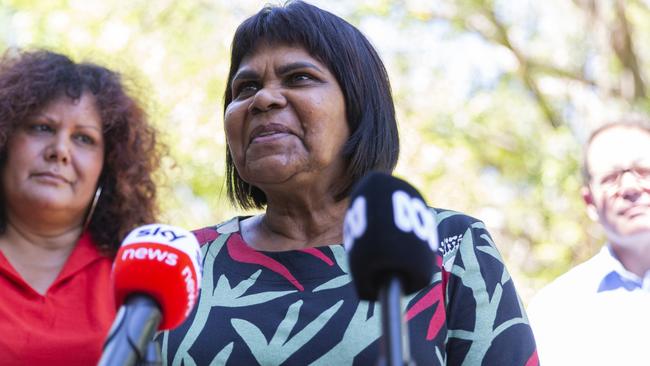
Ms Scrymgour was unwilling to divulge what dramas occurred out with remote polling teams, but confirmed “they weren’t AEC staff”.
Political parties often send out teams to follow the AEC’s mobile polling teams as they collect votes in remote communities, in a process known as RAMP.
Ms Scrymgour said resourcing the AEC was “critical” and she was interested in turnout in communities in the Kimberleys and North Queensland. She also raised the prospect of “direct enrolment” as a reform needed to drive voter turnout in remote communities.
Amid a growing Greens presence in federal parliament, Ms Scrymgour also said any expansion of onshore gas needs to be subject to “environmental monitoring and regulation”.
She said a so-called “water trigger” would be legislated by federal Labor, to limit the amount of water used by shale gas.
“I know the Greens, once they dissect this, it will allay a lot of the fears,” she said.
Ms Scrymgour also said the federal government would be more involved in trying to solve generational issues in Indigenous communities, particularly amid growing rates of crime in some of Lingiari’s bigger towns and centres.
“We’ve got to rebuild community,” she said, pointing to recent violence in Wadeye and the resurgence of petrol sniffing in Papunya.
“We can’t stand back from that, and think that it’s somebody else’s problem.”
“It’s our problem, it’s a community problem, and both governments have got to work together to make sure that people can feel safe, and that we get community back on track both in our remote communities, but also in places (like) Darwin, Rural Darwin, Katherine and Tennant.
“It’s going to take a mammoth effort.”
UPDATE, FRIDAY MAY 27: LABOR has finally declared itself the winner of the vast Northern Territory electorate of Lingiari, after a tight contest between Marion Scrymgour and the CLP’s Damien Ryan.
The result means Ms Scrymgour will join Luke Gosling, Malarndirri McCarthy and Jacinta Price in representing the Territory in Canberra.
Labor made the declaration, almost a week after the election, after postal votes were counted on Friday which meant Mr Ryan would be unable to catch the former deputy chief minister.
But Ms Scrymgour will have to work hard in parliament to deliver for the Territory, holding the seat by a razor thin margin of just 1251 votes as of Friday afternoon.
Turnout in the electorate was also lower - the Australian Electoral Commission recorded that only 62 per cent of voters had cast their vote as of Friday afternoon, well below the national average.
In a statement, Ms Scrymgour said she wanted to “thank the electors of Lingiari for their support”.
“I would also like to acknowledge and thank all of the other candidates who put themselves forward to contest the election,” she said.
“Finally, I’d like to thank the Northern Territory Labor Branch, the mighty trade union movement, my volunteers, family and supporters for all of their help over the last 18 months.”
On Thursday morning, Northern Territory Chief Minister Natasha Fyles expressed concern about voter turnout in Lingiari, which includes the majority of the Territory’s remote Indigenous communities.
“I think we need to work with the Australian Electoral Commission and we need to look at what changes have been made over recent years, and how that impacts voter enrolment and turnout,” Ms Fyles said.
She said the issue would be “certainly something that I will raise with the incoming federal government”.
UPDATE, THURSDAY MAY 26: LABOR is “on the cusp” of claiming victory in Lingiari, according to a well-placed source.
The party’s Marion Scrymgour is yet to claim victory in the vast electorate that covers all of the NT except Darwin.
Ms Scrymgour is leading over the CLP’s Damien Ryan by 1213 votes, as of Thursday afternoon.
Counting continued on Thursday following the narrow election result on Saturday.
Absentee ballots were added to the Australian Electoral Commission’s but at least 700 postal votes are yet to be counted.
Labor has confidence if the remaining postal votes produce a result “close to trend”, it will pick up the seat.
Every seat in this federal election is vital, given Labor is currently projected to win 76 seats in the lower house, which is minimum number needed to form majority government.
Several news organisations, including The Australian, have already called Lingiari for Labor.
UPDATE, TUESDAY MAY 24: LABOR is still leading the battle for Lingiari, with all polling places now officially counted.
ALP’s Marion Scrymgour remains in front of CLP’s Damien Ryan, with 51.27 per cent of the vote compared to 48.73 per cent.
It’s shifted a fraction back towards Ms Scrymgour, who was sitting on 51.23 per cent for the majority of yesterday.
Postal votes are still being counted, with Mr Ryan retaining the lead in the ones received so far.
Candidate Marion Scrymgour said she was concerned about bush voters not having enough resources to vote during polling time.
“Voters in the bush are paying the price for the decision made by the previous government to cut staff from the AEC’s Darwin office, including axing a field enrolment program,” she said.
“No Australian should be disenfranchised because of where they live.
“Limits on enrolling to vote, access to information in language and access to polling booths are factors that are silencing too many first nations people,” Ms Scrymgour said.
“Improving Indigenous voter participation must be a priority for all levels of government.”
UPDATE, MONDAY MAY 23: LABOR looks likely to retain the seat of Lingiari, despite the vote swinging marginally towards the Red Centre’s CLP candidate.
It comes as Lingiari accounts for all bush voters in the Territory with the seat having a high number of informal voters compared to the 2019 election.
Lingiari had 6.15 per cent of informal votes compared to the national average of five per cent.
In 2019, the seat had a lower rate of informal voters at just over five per cent.
An informal vote is when the ballot paper was either incorrectly or not fully completed, or doesn’t clearly identify candidates selected on the ballot which doesn’t count in the Federal election tally.
Solomon which covers Darwin and Palmerston was lower than the national average at 3.37 per cent.
Australian Electoral Commission has provided data which reveals out of the 74,050 of people enrolled to vote in Lingiari only 60.64 per cent cast one.
This is a lower turnout compared to the previous federal election who had over 72 per cent of votes out of 70,023 people who were enrolled.
As of Monday afternoon, ALP’s Marion Scrymgour had 51.23 per cent of the vote, while Damien Ryan was sitting on 48.77 per cent.
A major news organisation had called the seat in favour of Labor late on Sunday afternoon.
Ms Scrymgour posted on Facebook an hour after the call.
“Australia has voted for change, for a better future,” she wrote.
In the postal votes currently being counted, Mr Ryan still had the upper hand, with 62.75 per cent of those votes going towards CLP.
As of 8am, 100.21 per cent of the ballot papers had been counted.
UPDATE, SUNDAY, MAY 22: SENIOR figures within Labor say the party has done better than expected in Alice Springs, winning some booths in the Red Centre town, and is in a better position than the CLP to win the vast Territory electorate of Lingiari.
The count had barely changed at 11am Sunday compared with late Saturday night, with the Australian Electoral Commission’s two-party preferred tally showing Labor’s Marion Scrymgour sitting on 51.46 per cent of the vote, compared with the CLP’s Damien Ryan on 48.54 per cent.
One senior Labor source said “we would rather be us than the CLP right now”, noting that Labor’s vote had held up surprisingly well in parts of Alice Springs.
That’s despite the CLP putting up Mr Ryan, a long-time Alice Springs mayor.
But the same senior source said the Country Liberals were being heavily favoured in postal voting, according to scrutineers, but added that “he won’t catch us on postals”.
Ms Scrymgour had 50.7 per cent of the vote after preferences in the Alice Springs Town Council polling booth, and 51.28 per cent of the Alice Springs prepoll vote.
The booth of Sadadeen, in Alice Springs’ eastern suburbs, also came back strongly for Labor, with the party notching up 60.7 per cent of the two-party preferred vote.
Booths in the Darwin rural area broke strongly towards Mr Ryan and the CLP, as did the Alice Springs booth of Larapinta. Katherine was comfortably held by the CLP.
Only one of the 16 remote mobile voting booths in the Territory favoured the CLP – the rest have so far fallen toward Labor.
But a party insider said they were seeing swings against them in remote communities, likely a result of the departure of long-time Labor figure Warren Snowdon.
Marion Scrymgour, Damien Ryan still in play for Lingiari
LABOR is optimistic about retaining the seat of Lingiari, but its candidate Marion Scrymgour was cautious not to declare her party victorious on Saturday night.
As the vote count for the seat encompassing all of the Northern Territory outside Darwin neared the halfway mark, Ms Scrymgour arrived to the Labor camp in Alice Springs to a hero’s welcome.
But at 10.40pm last night, the Labor candidate was only leading the two candidate preferred 50.82 per cent to 49.18 per cent to the Country Liberal Party’s Damien Ryan.
The former mayor had a late evening swing in his favour, with the seat looking more and more likely to come down to preferences. The swing against Labor was sitting at 8.21 per cent.
Ms Scrymgour, a former deputy chief minister and Northern Land Council chief executive, thanked Labor branch members and volunteers for their support throughout the arduous six-week campaign.
She told a room of more than 80 supporters that the count was too close to call, but held high hopes.
“We’ll continue the counting, but we’re in a better position than we all thought we’d be,” she said, giving a special acknowledgment to support received from the unions.
“It’s fantastic to be in this position. I’d rather be in this position than the position that the CLP is in.”
The Labor camp, based at the Araluen Arts Centre, remain buoyed throughout the evening as results trickled in from around the nation, including an early call projecting a win for Labor in the seat of Solomon.
Retiring Lingiari MP Warren Snowdon arrived at the arts centre alongside his successor, telling the crowd Ms Scrymgour would be a “very, very good Member of the federal parliament”.
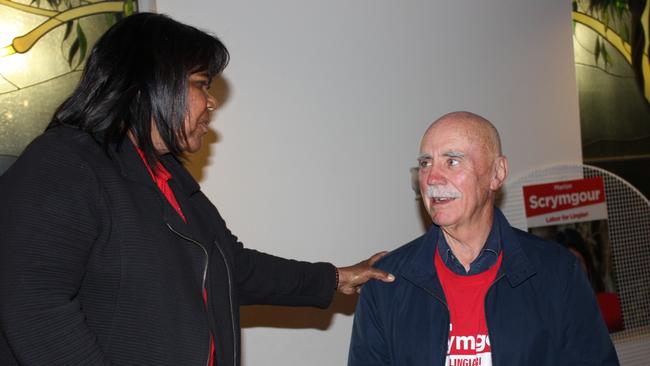
“When Marion nominated (herself for preselection), I thought what a magnificent opportunity for the Northern Territory,” he said.
“There’s no reason why we won’t win this, but we haven’t won this yet.
“This will be another Aboriginal voice, another Aboriginal person in Canberra.”
Across town at the Alice Springs Turf Club, the mood was sombre in the CLP camp earlier in the night, as the polls from around the nation rolled in.
Senate hopeful Jacinta Price was joined by former Labor Party president Warren Mundine – who ran for the Liberal Party at the last federal election.
Popular minor parties included the Greens, Pauline Hanson’s One Nation, the United Australia Party and the Liberal Democrats.
More Coverage
